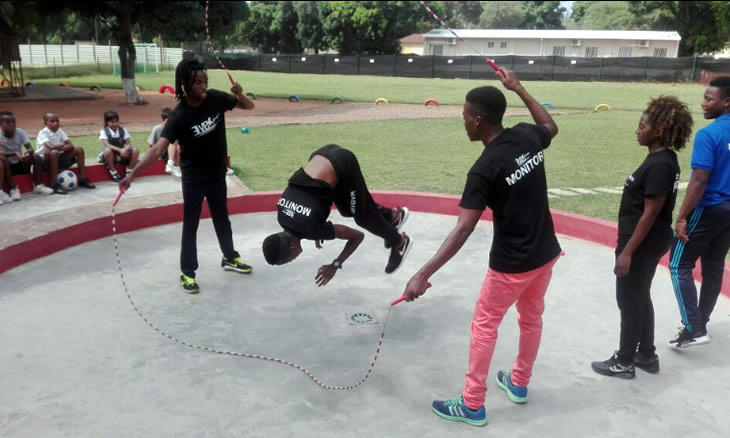Paratus Mozambique champions historic expedition
Mozambique’s three-time world jump rope champions to withdraw from international competition

O País
“It’s the end. It sounds like a lie, but it’s true. Ending is so bad. Why does it have to be like this?,” sings the talented Matias Damásio in one of his compositions.
The farewell, unbelievable, seems inevitable with the three-time world jump rope champions who raised the flag of Mozambique high and made the “Pátria Amada” [national anthem] echo across the majestic stages of the World.
And they deserved all honours, having been received in joy and by the head of state.
Party environment greets returning 3-times world jump rope champions
But the reality on the ground, where the whole process of training and preparation of the world champions begins, is painful. The Mozambican Gymnastics Federation, for example, attends all competitions at its own cost.
In addition to being cash-strapped, the national rope jumping athletes were several times the last to reach the World Series because of the gruelling trips to which they were subjected.
In 2015, in France, even after winning two world championships out of 23 teams, the gymnasts felt marginalised and even decided to abandon international competition.
In fact, they left for French territory without pocket money and with no accompanying sports leader.
Urged to defend the title and the country, in a sea of promises of financial support, they reconsidered their position and, in 2017, won the “tri” in the USA – an unprecedented feat that conceals the setbacks they weathered during their preparation and the competition itself.
Mozambican rope skippers (again) bring home the gold, this time from Arnold Classic Africa
Moreover, participation in the competition was only to be possible through a promise to pay US$4,000 to the World Jump Rope Federation.
It went so far as the international federation threatening to withdraw the three titles won by Mozambique and ban it from World Cups if the debt was not paid.
“After all we have suffered to participate in international competitions at our own cost, what we have left is to focus on popularising. We will no longer participate in world cups, and from now will work internally with children from private and public schools, because jump rope exists and it is a sport to be respected,” said Elvis Tembe, technical director of the Mozambican Gymnastics Federation.
Participation in the World Cup in France was possible because the organisers paid part of the expenses of the Mozambican jump rope team out of a wish to show the work that is being done in Africa.
“France was prepared to pay a portion of the amount because it wanted to show that the project in the African countries had paid off. It remained for Mozambique to pay the remaining amount, thus obliging the Federation to use the money that the Sports Promotion Fund allocates to the support of the Associations. We had to knock on many doors, and it was a very difficult, but thanks heavens we got it,” Tembe explained.
Four years earlier, in 2011, our national gymnastics team gave the world a demonstration which attracted the attention of powers like the USA.
The first invitation to participate in a word competition, in France, was recognition of the quality of the Mozambican gymnasts.
“For us, that victory meant change. We thought that we would never again have to suffer in order to compete, because after this result, not only Mozambique but also the world would know that we are capable of. And our expectations grew as a result of the triumphal reception we had from the president and the former Youth and Sports minister. They asked us what our difficulties were and they made promises that were never fulfilled,” Tembe says.
Seduced and abandoned
“When we were invited to participate in the World Cup in 2017, we were very afraid and we did not want to go through the same suffering but the Youth Ministry promised to pay for the tickets and the entries. Once again we went through the same problem, but we made the decision to participate and became world champions without even having paid for the registrations,” says Tembe.
Tembe also says that it took a lot of pressure for the Ministry of Youth and Sports to pay the US$ 4,000 debt contracted in 2017.
Tembe points out that “the least we expect is that we will be treated with due respect, because we give our lives for the country, and except in the national sports gala we do not hear anyone say so much as congratulations, except when giving the prize.”
The Mozambican rope jumping athletes have always travelled to competitions unaccompanied and, according to Tembe, it was he who played this “exhausting” role.
He supports his statement with the heavy experience of “attending meetings and listening to discipline rules and then finding the time to train and almost spending the nights awake.
Tembe says his group was always last to perform at events, even the only ones on the track. In 2017, in the U.S., the Mozambican gymnasts went on track the same day they arrived in the country. Tembe remembers that they even went to bed without dinner.
The only thing that allowed them to participate in the competition at all, he says, was the fact that the games started with the newcomers. He went on to recall that, when they mounted the podium for the third time, in 2017, “Viva a Frelimo” and not “Pátria Amada” was played, because they had no accompanying staff to update the preference.













Leave a Reply
Be the First to Comment!
You must be logged in to post a comment.
You must be logged in to post a comment.